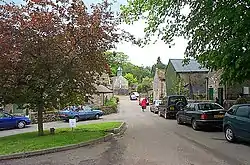Middleton-by-Youlgreave
Middleton, often known as Middleton-by-Youlgreave or Middleton-by-Youlgrave to distinguish it from nearby Middleton-by-Wirksworth, is a village in the Peak District, Derbyshire, England. The appropriate civil parish is called Middleton and Smerrill. The population of this parish was 137 at the 2011 Census.[1] It lies south west of Youlgreave, above the River Bradford. Its main industries are farming and tourism.
| Middleton | |
|---|---|
 in 2003 | |
 Middleton Location within Derbyshire | |
| Population | 137 (2011) |
| OS grid reference | SK195631 |
| Civil parish |
|
| District | |
| Shire county | |
| Region | |
| Country | England |
| Sovereign state | United Kingdom |
| Post town | BAKEWELL |
| Postcode district | DE45 |
| Dialling code | 01629 |
| Police | Derbyshire |
| Fire | Derbyshire |
| Ambulance | East Midlands |
| UK Parliament | |
History
This manor was mentioned in the Domesday book as belonging to Henry de Ferrers;[2] it included a mill and was worth sixteen shillings.[3]
The village grew during the Middle Ages. Middleton Castle, a fortified manor house, was built in the early seventeenth century, and saw some fighting during the English Civil War. Christopher Fulwood attempted to raise a Royalist force from his base in the Castle, but on 16 November 1643, Roundhead troops raided the house and killed Fulwood. The Castle now lies in ruins.
The settlement's present appearance dates from the early nineteenth century. Thomas Bateman rebuilt the entire village in the 1820s, incorporating the mullioned windows of earlier buildings to retain something of its traditional appearance. The small parish church also dates from this period, and Bateman rebuilt Middleton Hall as his own residence.
Bateman's grandson, the archaeologist also named Thomas Bateman, lived in the village, and built Lomberdale Hall as his residence.
An annual well dressing takes place in the village, and the village hosts an annual musical festival, showcasing local musicians every summer. Arbor Low lies two miles west of Middleton.
References
- "Civil Parish population 2011". Neighbourhood Statistics. Office for National Statistics. Retrieved 28 March 2016.
- Henry was given a large number of manors in Derbyshire including Doveridge, Linton, Pilsbury and Cowley.
- Domesday Book: A Complete Translation. London: Penguin, 2003. ISBN 0-14-143994-7 p.748
External links
| Wikimedia Commons has media related to Middleton-by-Youlgreave. |